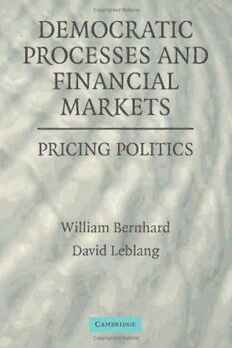
Democratic Processes and Financial Markets: Pricing Politics PDF
270 Pages·2006·1.845 MB·English
Most books are stored in the elastic cloud where traffic is expensive. For this reason, we have a limit on daily download.
Preview Democratic Processes and Financial Markets: Pricing Politics
Description:
The authors examine the conditions under which democratic events, including elections, cabinet formations, and government dissolutions, affect asset markets. Where these events have less predictable outcomes, market returns are depressed and volatility increases. In contrast, where market actors can forecast the result, returns do not exhibit any unusual behavior. Further, political expectations condition how markets respond to the political process. When news causes market actors to update their political beliefs, market actors reallocate their portfolios, and overall market behavior changes. To measure political information, Professors Bernhard and Leblang employ sophisticated models of the political process. They draw on a variety of models of market behavior, including the efficient markets hypothesis, capital asset pricing model, and arbitrage pricing theory, to trace the impact of political events on currency, stock, and bond markets. The analysis will appeal to academics, graduate students, and advanced undergraduates across political science, economics, and finance.
See more
The list of books you might like
Most books are stored in the elastic cloud where traffic is expensive. For this reason, we have a limit on daily download.
